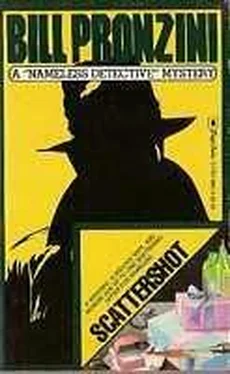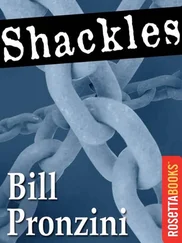Bill Pronzini - Scattershot
Здесь есть возможность читать онлайн «Bill Pronzini - Scattershot» весь текст электронной книги совершенно бесплатно (целиком полную версию без сокращений). В некоторых случаях можно слушать аудио, скачать через торрент в формате fb2 и присутствует краткое содержание. Год выпуска: 0100, Жанр: Криминальный детектив, на английском языке. Описание произведения, (предисловие) а так же отзывы посетителей доступны на портале библиотеки ЛибКат.
- Название:Scattershot
- Автор:
- Жанр:
- Год:0100
- ISBN:нет данных
- Рейтинг книги:5 / 5. Голосов: 1
-
Избранное:Добавить в избранное
- Отзывы:
-
Ваша оценка:
- 100
- 1
- 2
- 3
- 4
- 5
Scattershot: краткое содержание, описание и аннотация
Предлагаем к чтению аннотацию, описание, краткое содержание или предисловие (зависит от того, что написал сам автор книги «Scattershot»). Если вы не нашли необходимую информацию о книге — напишите в комментариях, мы постараемся отыскать её.
Scattershot — читать онлайн бесплатно полную книгу (весь текст) целиком
Ниже представлен текст книги, разбитый по страницам. Система сохранения места последней прочитанной страницы, позволяет с удобством читать онлайн бесплатно книгу «Scattershot», без необходимости каждый раз заново искать на чём Вы остановились. Поставьте закладку, и сможете в любой момент перейти на страницу, на которой закончили чтение.
Интервал:
Закладка:
In any case, it all amounted to one thing: my ass was still frying away on the griddle.
I went out.for some air. I thought about buying a paper, decided I didn’t want to know what the media had to say about yesterday’s events, and walked around for a while in the fog. Then I came back and picked up my car and drove aimlessly around the city, just marking time.
At eleven o’clock I headed home again, where I got into my rented monkey suit, feeling like the idiot Eberhardt claimed I was. After which I collected Milo Petrie’s.38 Police Special-I had brought it inside the flat for safekeeping-and put it into a small portfolio case, along with a couple of pulp magazines. Then I clumped downstairs again.
Litchak, the retired fire inspector, was just coming out of his ground-floor apartment. He looked me up and down and said, “Well, ain’t you something to see. Going to a wedding?”
“More or less,” I growled.
“I never saw you dressed up like that before,” he said. “You don’t mind my saying so, you look a little lumpy.”
“I feel a little lumpy.”
“Grouchy, too. Not that I blame you. You’re getting to be a real celebrity these days.”
“Yeah.”
“But it’ll all work out for you. People like heroes, and that’s what you are. An honest-to-Christ hero, even if you don’t look like one. Or dress like one.”
“Yeah.” I started for the door.
“Jogging suit last Sunday and soup-and-fish today,” Litchak said behind me. “My, my. Ain’t you really something, now!”
SIXTEEN
There was fog in the city, and thick gray billows of it coming in through the Golden Gate, but when I got across the bridge the sky was clear and the sun was shining. Nice day over in Marin. For some people, anyway.
I kept imagining that occupants of other cars were staring at me as I drove; I felt like a guy in a gorilla suit in one of those slapstick comedies Mack Sennett used to make. Look at the funny man, daddy. Isn’t he something? Yeah. Litchak had hit it right on the nose, in more ways than he knew. I was really something, all right.
It was a quarter past twelve when I took the Greenbrae Avenue exit off the freeway, and twenty of one when I rolled into the quiet, tree-shaded affluence of Ross. The directions George Hickox had given me were easy enough to follow; I arrived at Number Eighty Crestlawn Drive with six minutes to spare.
The Mollenhauer estate was pretty impressive, even by Ross standards. High stone walls surrounded it, topped with iron spikes and pieces of broken colored glass embedded in a layer of concrete. A pair of huge wrought-iron gates were closed across the entrance drive; inside them was an old-fashioned gatehouse and an old-fashioned gatekeeper to go with it. Beyond, the drive hooked up through an acre of bright green lawn dotted with black oaks to where an imposing Tudor-style house sat on higher ground.
The gatekeeper took my name, used a telephone in the gatehouse, and came back finally and swung the gates open for me. I drove inside. Off to the north I saw, as I neared the main house, a second building of the type that used to be called a carriage house. It was being painted, and there was a network of metal scaffolding, ropes, pulleys, and suction clamps along the near side wall; that wall was a fading cream color, but the front was a bright gleaming white-that much of the job had been finished in time for the wedding. The scaffolding looked as out of place in these surroundings as I felt.
In front of the main house the drive blended into a circular parking area with a fountain in the center of it. I put my car between a Mercedes and a Bentley-nice company-and took the.38 and its belt holster out of the portfolio case. When I had the thing fitted on under the left wing of the tux coat I caught up the portfolio and stepped out. There was nothing else in the case except the two pulp magazines. I thought it would be all right if I spent my guard duty reading while I watched over the wedding gifts, instead of just sitting like a lump and merely watching; hell, the way I felt I was going to read whether it was all right or not. But I didn’t want to just walk in there with the magazines exposed in my hand. There was no point in advertising what Mr. Clyde Mollenhauer would no doubt consider my lack of breeding.
A uniformed maid answered the door chimes and admitted me. The interior of the house was opulent, furnished with taste and care, all in antiques. She ushered me through a couple of rooms and down a wide hallway. Halfway along was an open set of double mahogany doors; we went through them into a study lined with books and appointed with masculine-type antiques.
There were three men in the room, all of them wearing tuxedos and looking far more comfortable and proper in them that I did in mine. When the maid announced me the oldest of the trio detached himself from the other two and came over to introduce himself. Clyde Mollenhauer. He was in his late forties or early fifties, tall and trim, with an air of forcefulness about him. He had straight black hair, penetrating eyes the color of burnt umber, and a Hapsburg jaw that made his lower teeth prominent when he opened his mouth.
If he was a bigot or a snob, or if he still harbored reservations about my honesty and reliability, you couldn’t tell it from outward appearances; he seemed courteous enough, and there was no trace of condescension or suspicion in his voice. But I was aware that he had not offered to shake hands with me.
He led me over to the other two. One was George Hickox, looking as stiff-necked and officious as he had in my office. I asked him how he was, and he said he was fine, thank you. He didn’t bother to ask how I was.
The third guy turned out to be Stephen Walker, Mollenhauer’s imminent son-in-law. He was maybe twenty-five, handsome in a brittle, actorish way; his hair, a wavy dark brown, was so flawlessly cut and combed that it looked artificial. When Mollenhauer introduced us Walker gave me a brief nod and looked right through me. This one I was sure about-snob all the way, as young as he was.
A short awkward silence ensued. They were uncomfortable because of who and what I was, — I was uncomfortable because of who and what they were. What do the rich and cloistered say to a big, lumpy Italian private detective whose ass was frying on a griddle? What does the pulp-reading private eye say to them?
There was only one thing I could think of, and I said it: “Have all the wedding gifts been delivered, Mr. Mollenhauer?”
“Yes. All except a special gift for my daughter from me. It should arrive at any moment.”
“If you’ll show me where they are-”
“Certainly.” He looked at Hickox. “George, if the man from the jewelry store should come before I return, bring him to the gift room.”
“Of course, Mr. Mollenhauer.”
Mollenhauer took me back through the house, down another hallway, and finally into a long rear wing; neither of us spoke. The rear half of the wing’s outer wall was made of glass, and through it you could see a stadium-sized terrace with an L-shaped swimming pool at one end. Three women in maids’ uniforms were busily setting up buffet and bar tables and arranging pieces of white wrought-iron garden furniture. It was going to be quite a party; there was even a dais for an orchestra.
We went all the way to the end of the wing, where a window in the back wall looked out past some shrubbery to more rolling lawn and more black oaks. Mollenhauer stopped in front of the last door on the left and unlocked it. He led me inside.
The room’s normal function was probably that of a spare bedroom; now it was jammed, like a kid’s dream of Christmas, with what had to be well over two hundred gaily wrapped packages of varying sizes and shapes. They were everywhere- along the walls, on the double bed, and on all the other furniture-but you could tell that they had been laid out by careful hands, to avoid possible damage. A small table had even been positioned near the foot of the bed to hold the tinier presents; the seven packages on it had been arranged in a row, three with pink bows and three with blue bows and one with a white bow in the middle. Cute.
Читать дальшеИнтервал:
Закладка:
Похожие книги на «Scattershot»
Представляем Вашему вниманию похожие книги на «Scattershot» списком для выбора. Мы отобрали схожую по названию и смыслу литературу в надежде предоставить читателям больше вариантов отыскать новые, интересные, ещё непрочитанные произведения.
Обсуждение, отзывы о книге «Scattershot» и просто собственные мнения читателей. Оставьте ваши комментарии, напишите, что Вы думаете о произведении, его смысле или главных героях. Укажите что конкретно понравилось, а что нет, и почему Вы так считаете.












